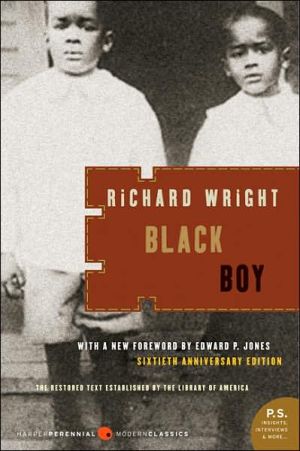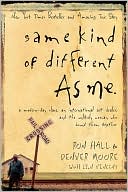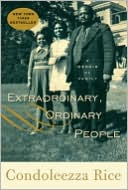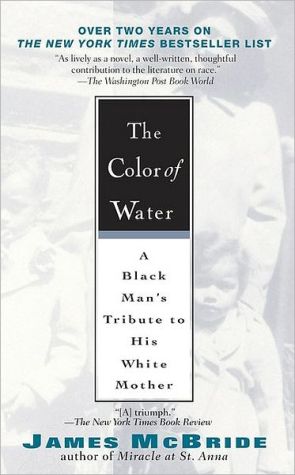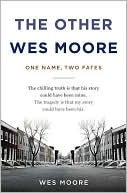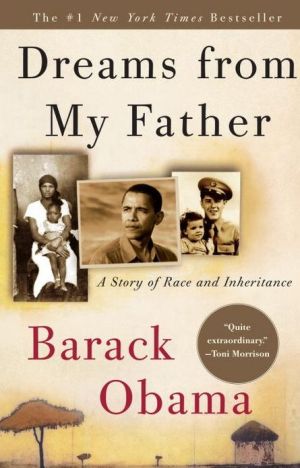Black Boy
This incredible bestselling classic is Richard Wright's unforgettable and eloquent autobiography of growing up in the Jim Crow South.\ \ In this once sensational, now classic autobiography, Richard Wright tells with unforgettable fury and eloquence what he thought.\
Search in google:
Richard Wright grew up in the woods of Mississippi, with poverty, hunger, fear, and hatred. He lied, stole, and raged at those around him; at six he was a "drunkard," hanging about taverns. Surly, brutal, cold, suspicious, and self-pitying, he was surrounded on one side by whites who were either indifferent to him, pitying, or cruel, and on the other by blacks who resented anyone trying to rise above the common lot. Black Boy is Richard Wright's powerful account of his journey from innocence to experience in the Jim Crow South. It is at once an unashamed confession and a profound indictment—a poignant and disturbing record of social injustice and human suffering.Sacred FireBlack Boy is Richard Wright s unforgettable story of growing up in the Jim Crow South. Published in 1945, it is often considered a fictionalized autobiography or an autobiographical novel because of Wright s use of fiction techniques (and possibly fictional events) to tell his story. Nevertheless, the book is a lyrical and skillfully wrought description of Wright s hungry youth in rural Mississippi and Memphis, told from the perspective of the adult Wright, who was still trying to come to grips with the cruel deprivations and humiliations of his childhood. Life in the pre—civil rights South was intensely alienating for young Richard. At every turn, his desire to communicate was stunted, whether by famiIy members who insisted he "hush!" or by teachers who harassed and mocked him. He was surrounded by people he considered contemptibly ignorant, people who willingly allowed their lives to be restricted by tradition and authority no matter how illegitimate or self-destructive. Whether they were racist whites or passive, uncompassionate blacks, his fellow southerners viewed Richard s independence and intelligence with suspicion and scorned and humiliated him for his family's poverty. He lashed out by hitting the streets: He was already drinking by the time he turned six, and he fought constantly. He finally found his outlet in writing; by the end of the book, he decided that there was nothing he could ever do to improve his life in the South and committed to moving to Chicago to pursue his art. When first published,Black Boy was considered by many to be an angry attack on the racist South because of Wright s hard-hitting portrayal of the racism he faced, not to mention his already-acquired reputation as a "protest writer." But the book s value goes deeper than that: Wright bears witness to the American struggle for the right of self-definition. His own quest to escape the suffocating world of his childhood and find a place where he could freely exercise his individuality, creativity, and integrity was ultimately successful. But Black Boy also offers insight into an entire culture of people, both black and white, who had unthinkingly accepted a narrowly prescribed course of life. As Wright put it, "[though] they lived in America where in theory there existed equality of opportunity, they knew unerringly what to aspire to and what not to aspire to." Despite Wright s stifling environment, his story is inspirational for its portrait of how a black boy shucked off the limited expectations of those around him and dared to aspire.
Black Boy\ Chapter One\ One winter morning in the long-ago, four-year-old days of my life I found myself standing before a fireplace, warming my hands over a mound of glowing coals, listening to the wind whistle past the house outside. All morning my mother had been scolding me, telling me to keep still, warning me that I must make no noise. And I was angry, fretful, and impatient. In the next room Granny lay ill and under the day and night care of a doctor and I knew that I would be punished if I did not obey. I crossed restlessly to the window and pushed back the long fluffy white curtains-which I had been forbidden to touch-and looked yearningly out into the empty street. I was dreaming of running and playing and shouting, but the vivid image of Granny's old, white, wrinkled, grim face, framed by a halo of tumbling black hair, lying upon a huge feather pillow, made me afraid.\ The house was quiet. Behind me my brother-a year younger than I-was playing placidly upon the floor with a toy. A bird wheeled past the window and I greeted it with a glad shout.\ "You better hush," my brother said.\ "You shut up," I said.\ My mother stepped briskly into the room and closed the door behind her. She came to me and shook her finger in my face.\ "You stop that yelling, you hear?" she whispered. "You know Granny's sick and you better keep quiet!"\ I hung my head and sulked. She left and I ached with boredom.\ "I told you so," my brother gloated.\ "You shut up," I told him again.\ I wandered listlessly about the room, trying to think of something to do, dreading the return of my mother, resentful of being neglected. The room heldnothing of interest except the fire and finally I stood before the shimmering embers, fascinated by the quivering coals. An idea of a new kind of game grew and took root in my mind. Why not throw something into the fire and watch it burn? I looked about. There was only my picture book and MY mother would beat me if I burned that. Then what? I hunted around until I saw the broom leaning in a closet. That's it ... Who would bother about a few straws if I burned them? I pulled out the broom and tore out a batch of straws and tossed them into the fire and watched them smoke, turn black, blaze, and finally become white wisps of ghosts that vanished. Burning straws was a teasing kind of fun and I took more of them from the broom and cast them into the fire. My brother came to my side, his eyes drawn by the blazing straws.\ "Don't do that," he said.\ "How come?" I asked.\ "You'll burn the whole broom," he said.\ "You hush," I said.\ "I'll tell," he said.\ "And I'll hit you," I said.\ My idea was growing, blooming. Now I was wondering just how the long fluffy white curtains would look if I lit a bunch of straws and held it under them. Would I try it? Sure. I pulled several straws from the broom and held them to the fire until they blazed; I rushed to the window and brought the flame in touch with the hems of the curtains. My brother shook his head.\ "Naw," he said.\ He spoke too late. Red circles were eating into the white cloth: then a flare of flames shot out. Startled, I backed away. The fire soared to the ceiling and I trembled with fright. Soon a sheet of saw her taut face peering under the edge of the house. She had found me! I held my breath and waited to hear her command me to come to her. Her face went away; no, she had not seen me huddled in the dark nook of the chimney. I tucked my head into my arms and my teeth chattered.\ "Richard!"\ The distress I sensed in her voice was as sharp and painful as the lash of a whip on my flesh.\ "Richard! The house is on fire. Oh, find my child!"\ Yes, the house was afire, but I was determined not to leave my place of safety. Finally I saw another face peering under the edge of the house; it was my father's. His eyes must have become accustomed to the shadows, for he was now pointing at me.\ "There he is!"\ "Naw!" I screamed.\ "Come here, boy!"\ "Naw!"\ "The house is on fire!"\ "Leave me 'lone!"\ He crawled to me and caught hold of one of my legs. I hugged the edge of the brick chimney with all of my strength. My father yanked my leg and I clawed at the chimney harder.\ "Come outta there, you little fool!"\ "Turn me loose!"\ I could not withstand the tugging at my leg and my fingers relaxed. It was over. I would be beaten. I did not care any more. I knew what was coming. He dragged me into the back yard and the instant his hand left me I jumped to my feet and broke into a wild run, trying to elude the people who surrounded me, heading for the street. I was caught before I had gone ten paces.\ From that moment on things became tangled for me. Out of the weeping and the shouting and the wild talk, I learned that no one had died in the fire. My brother, it seemed, had finally overcome enough of his panic to warn my mother, but not before more than half the house had been destroyed. Using the mattress as a stretcher, Grandpa and an uncle had lifted Granny from her bed and had rushed her to the safety of a neighbor's house. My long absence and silence had made everyone think, for a while, that I had perished in the blaze.\ Black Boy. Copyright (c) by Richard Wright . Reprinted by permission of HarperCollins Publishers, Inc. All rights reserved. Available now wherever books are sold.
\ Sacred FireBlack Boy is Richard Wright’s unforgettable story of growing up in the Jim Crow South. Published in 1945, it is often considered a fictionalized autobiography or an autobiographical novel because of Wright’s use of fiction techniques (and possibly fictional events) to tell his story. Nevertheless, the book is a lyrical and skillfully wrought description of Wright’s hungry youth in rural Mississippi and Memphis, told from the perspective of the adult Wright, who was still trying to come to grips with the cruel deprivations and humiliations of his childhood.\ Life in the pre—civil rights South was intensely alienating for young Richard. At every turn, his desire to communicate was stunted, whether by famiIy members who insisted he "hush!" or by teachers who harassed and mocked him. He was surrounded by people he considered contemptibly ignorant, people who willingly allowed their lives to be restricted by tradition and authority no matter how illegitimate or self-destructive. Whether they were racist whites or passive, uncompassionate blacks, his fellow southerners viewed Richard’s independence and intelligence with suspicion and scorned and humiliated him for his family's poverty. He lashed out by hitting the streets: He was already drinking by the time he turned six, and he fought constantly. He finally found his outlet in writing; by the end of the book, he decided that there was nothing he could ever do to improve his life in the South and committed to moving to Chicago to pursue his art.\ When first published,Black Boy was considered by many to be an angry attack on the racist South because of Wright’s hard-hitting portrayal of the racism he faced, not to mention his already-acquired reputation as a "protest writer." But the book’s value goes deeper than that: Wright bears witness to the American struggle for the right of self-definition. His own quest to escape the suffocating world of his childhood and find a place where he could freely exercise his individuality, creativity, and integrity was ultimately successful. But Black Boy also offers insight into an entire culture of people, both black and white, who had unthinkingly accepted a narrowly prescribed course of life. As Wright put it, "[though] they lived in America where in theory there existed equality of opportunity, they knew unerringly what to aspire to and what not to aspire to." Despite Wright’s stifling environment, his story is inspirational for its portrait of how a black boy shucked off the limited expectations of those around him and dared to aspire.\ \ \
